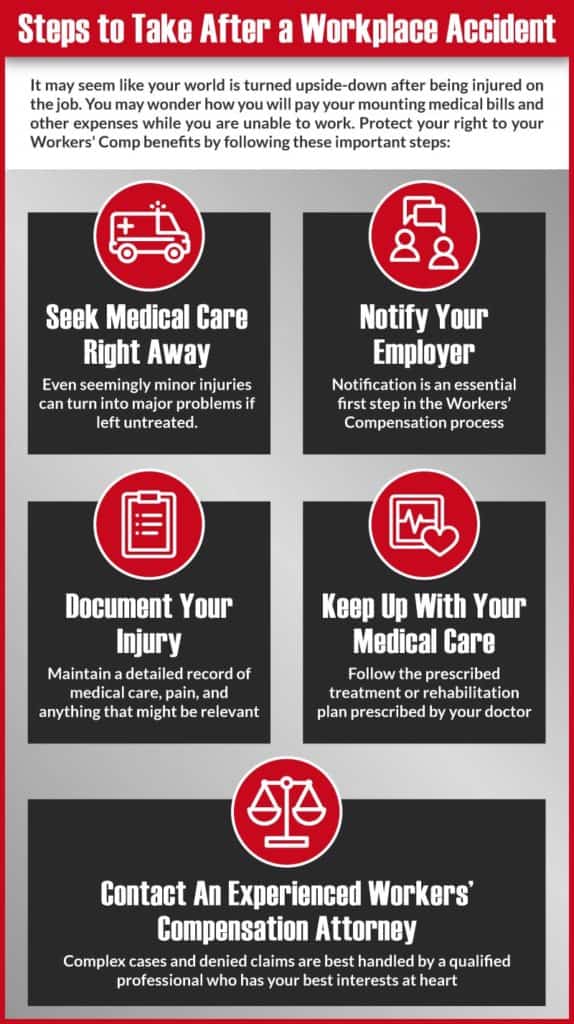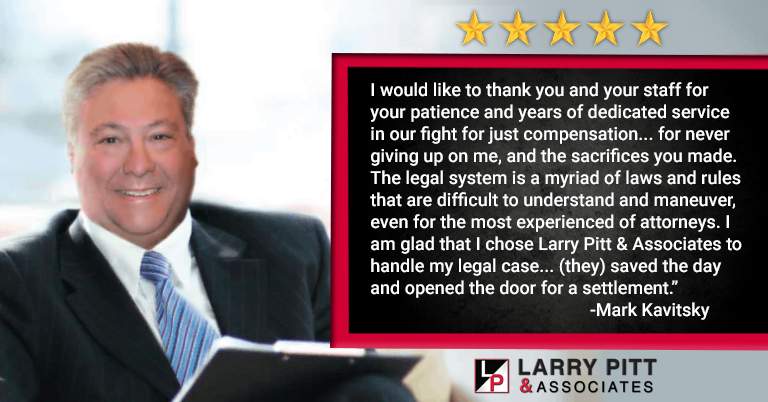Get Help From a Pennsylvania Workers' Compensation Lawyer You can Trust
Hurt At Work? Unsure About Your Rights?
A serious work injury can do more than physical harm: it can lead you to feel frustrated, anxious and unsure about the future.
- Who will protect your family?
- How will you pay your bill and now, medical bills?
- What options do you have?
- Am I entitled to workers’ compensation benefits?
GET A FREE CONSULTATION WITH LARRY PITT
Our Skilled Philadelphia Workers Compensation Lawyers at Larry Pitt & Associates, P.C. Put the Rights of Pennsylvania Workers First
If you or a loved one is suffering from a workplace illness or injury, Larry Pitt & Associates, P.C. will fight on your behalf. To schedule a free consultation with experienced Philadelphia workers compensation lawyers today, please call 888-PITT-LAW or complete our online contact form.
We represent injured workers throughout Pennsylvania, including:
How to File a Workers’ Compensation Claim
In Philadelphia, PA and throughout Pennsylvania, when an injury occurs at the workplace, benefits are governed by the Pennsylvania Workers’ Compensation Act. Under the Act, most workers are automatically covered; however, you may lose your benefits if you fail to follow the claims process when filing.
First and foremost, if you are in an accident at work, seek medical attention, even if you think your injury is minor. Sometimes the extent of an injury is not apparent until later. Cuts may become infected and other injuries may lead to bigger health problems down the road. A medical professional must document the initial injury to ensure you receive the pay, health & medical benefits to which you are entitled.
The following steps explain how to file a workers’ compensation claim:
Step 1. Report your injury to your supervisor.
- Employers in Pennsylvania are required to post form LIBC-500, which should include the name, address, and phone number of their workers’ compensation insurance company, administrator, or internal contact person. Follow the instructions posted.
- If you report your injury within 21 days you may be eligible to receive retroactive benefits. You must report your injury within 120 days of the incident; if you fail to do so, you may lose your rights to workers’ compensation benefits.
Step 2. Document your injury.
- In addition to medical treatment summaries and other medical records provided by your doctor, it may be helpful to keep a personal journal of pain or other issues you experience as a result of the accident.
Step 3. Contact an attorney.
- Making the adjustment to everyday life can be a lot easier with an experienced workers compensation lawyer by your side. This will allow you and your loved ones to focus on the healing process.
Step 4. Follow all prescribed medical treatments.
- Make sure to keep all appointments, including physical therapy and rehab sessions.
Larry Pitt & Associates provides comprehensive counsel for injured workers at every step of the process. We know that time is not on your side, so we strive to file your paperwork as quickly as possible. You can call us anytime at 888-PITT-LAW or contact us online to schedule a free consultation.

How Can a Workers Compensation Lawyer Help You?
- File an initial claim
- Determine the true cause of your accident
- Document your medical case to show whether you can return to work, and if so, when
- Handle calls from insurance company lawyers
- Review the types of settlements for which you might be eligible and determine what is in your best interest
- Handle third-party claims
- Appeal a denial of benefits
- Help with modification of benefits
Why Choose Larry Pitt & Associates

There are many reasons to choose Larry Pitt & Associates. First and foremost, our skilled workers compensation attorneys understand the Pennsylvania workers compensation law and have been protecting the legal rights of victims just like you in the Philadelphia area for more than four decades. In addition, our experience helping clients in a wide variety of industries gives us an advantage over other firms. The following are among the many types of clients we have been honored to help:
These workers represent only some of the many industries we have successfully represented.
If you have been hurt, we want you to know that no matter how dire things seem, there is a legal team with the experience and knowledge to help you. We know how to fight for your future, whether you were hurt in a workplace accident or illness. We have the skills, the resources, and the experience you need on your side.
If you are injured on the job, workers compensation, also called workmans comp, can relieve some of the financial burden associated with medical expenses and time out of work. However, you must be able to prove that your injury or illness is truly work related, or your claim may be denied. You need an experienced team of legal professionals on your side to make sure your claim is accepted and you receive the proper compensation for your workplace injury. For a free consultation and free case evaluation regarding the value of your claim, contact a workers compensation lawyer serving Philadelphia, PA at Larry Pitt & Associates at any time by calling 888-PITT-LAW.
What Our Clients Say

Workers' Compensation Claims FAQs
What Should I Do If My Workers' Compensation Claim Was Denied?
Your claim may be denied if your employer’s insurance company decides that your injury was not related to your workplace or not serious enough to prevent you from working. If your claim is denied, you will receive a Notice of Compensation Denial from your employer 21 days after you file your injury report. If you are notified about a denial of benefits, a skilled workers compensation lawyer can help you with all aspects of the appeals process, including the following:
- Denied workers compensation claims
- Navigating the appeals process
- Representing you during administrative hearings
It is best to enlist the help of a skilled legal team from the beginning to make sure your claim is accepted. However, if you choose to file for workers’ compensation on your own without a workers compensation lawyer and your claim is denied, contact Larry Pitt & Associates at 888-PITT-LAW to help you with the appeals process.
Can I Choose My Doctors?
The answer to the question “can I choose my doctors” depends upon your employer. Some employers allow you to choose your own doctor. However, in the state of Pennsylvania, employers have the right to create a list of designated healthcare providers that an employee must choose from if they file a workers’ compensation claim. When that happens, employers and employees must adhere to the following process:
- The employer must give the employee a written notice with the list of medical providers and an explanation of the employee’s rights and duties regarding the designated healthcare providers.
- The employee must sign the notice when they are hired and again if the list changes.
- The list must contain at least six healthcare providers within a reasonable geographic distance, and three of them must be physicians.
If you are injured, you must seek treatment from one of the designated healthcare providers for 90 days from the date of the first visit. However, if your injury requires treatment by a specialist and that particular specialty is not on the list, you may be permitted to choose your own healthcare provider for that specialty.
How Long Can You Collect Workers’ Comp?
How long you can collect workers’ comp depends largely on the severity of your illness or injury. While every Pennsylvania workers compensation case is different, typically your condition will be classified as total or partial.
- Total disability status applies to workers who are unable to work. After you have collected benefits for 104 weeks, your employer can request a medical examination to determine if you meet a certain threshold of impairment. If it is determined that you will never be able to go back to work, you may be entitled to wage-loss benefits for the rest of your life, or you may be offered a lump-sum settlement.
- Partial disability status entitles you to wage-loss benefits for up to 500 weeks if you can or do return to work at a lower-paying job according to the prescribed work restrictions. The total number of weeks for which you collect benefits depends on the nature and severity of your injury.
Also, if you have suffered a severe disfigurement such as the loss of a limb or body party, you may be offered a lump-sum payment.
To find out more about the length and types of workers’ compensation benefits to which you may be entitled, speak with an experienced workers’ compensation lawyer in Philadelphia, PA.
Who is Covered by Workers’ Compensation in Pennsylvania?
Workers’ compensation coverage is mandatory in Pennsylvania for nearly all workers. This includes full-time employees, part-time employees, and seasonal employees who are not contractors. The exceptions include employees who are covered under their respective federal workers’ compensation programs including railroad workers in interstate commerce, federal employees, and longshoremen/maritime workers. Domestic workers are optionally covered by workers’ compensation in Pennsylvania. Agricultural workers who work fewer than 30 days per year are not covered. There are also some religious exemptions.
It is important to note that employees are typically covered, even if the accident was their fault. In addition to covering injuries that occur on the job, workers compensation law in Pennsylvania also covers illnesses that result from exposure to hazardous substances, including asbestos and benzene and repetitive stress injuries.
Death benefits, also called fatal claim benefits, are usually paid to the dependent survivors if the death occurred from a work-related injury or illness. If the injury was caused by the negligence of a third party, such as a driver who caused a motor vehicle crash, a negligent construction site manager, or the manufacturer of a defective tool, the injured worker may be able to recover additional compensation by filing a third-party liability claim.
During 2016, there were more than 159,000 workers compensation cases reported to the Pennsylvania Bureau of Workers’ Compensation. The following list provides a breakdown of workers comp cases by industry:
- Educational and Health – 44,723
- Trade, Transportation, and Utilities – 41,323
- Manufacturing – 19.824
- Public Administration – 11,270
- Professional and Business Services – 11,190
- Leisure and Hospitality – 10,710
- Other – 19,621
All work injuries and illnesses resulting in death, permanent impairment, or loss of work time in excess of a day or shift are required to be reported to the Bureau of Workers’ Compensation in Pennsylvania.
Questions often arise concerning pre-existing conditions. If you suffered a workplace injury that exacerbated a pre-existing condition to the point where you are no longer able to work, you may be eligible for workers’ compensation.
How Much Money Can You Collect from Workers’ Compensation?
In general, the Pennsylvania Workers’ Compensation Act provides benefits for lost wages in an amount that is 66.66 percent (two-thirds) of your average weekly wage prior to your injury. However, this amount is subject to minimum and maximum compensation limits.
The maximum benefits are based on the statewide average weekly wage, which is recalculated every year by the Pennsylvania Department of Labor and Industry. For 2020, the average weekly wage was calculated to be $1081.00.
For the year 2020, your workers’ compensation benefits would be as follows:
- $1,081.00 if your weekly wage exceeds $1621.50
- Two-thirds (66.66 percent) of your salary if your weekly wage is between $1,621.50 and $810.76
- $540.50 per week if your weekly wage is between $810.75 and $600.56
- 90 percent of your salary if your average weekly wage is $600.55 or below
For updates on the calculation of the Pennsylvania statewide weekly wage, visit www.dli.pa.gov.
Can My Workers’ Compensation Benefits Change?
Unfortunately, there is always the risk that your workers’ compensation benefits change or be terminated entirely based on periodic input from medical or vocational experts.
In addition to reduced benefits, you also risk termination of benefits. If the workers compensation judge determines that you are capable of earning the same wages you earned before your work injury, your benefits could be terminated entirely.
Any decrease in your pay benefits could spell financial disaster. If you are notified about a change in benefits, it is crucial to seek experienced legal representation. We can help ensure your rights are protected by collecting and presenting evidence to support your claim so you can continue to receive the benefits you need.
What Types of Injuries are Covered by Workers’ Compensation?
Workers’ compensation covers many types of injuries that happen as a result of workplace accidents.
Common Workplace Accident Injuries
- Amputations
- Broken bones
- Burns
- Concussions
- Cuts, lacerations, and puncture wounds
- Electric shock
- Traumatic brain & head injuries
- Knee injuries
- Ladder and scaffolding injuries
- Neck & back injuries
- Nerve damage
- Slip and fall injuries
- Strains and sprains from overexertion
Workers’ compensation also covers medical conditions that develop over time due to workplace hazards or conditions.
Common Workplace Hazards & Conditions
- Asbestos exposure
- Asthma
- Computer vision problems
- Lead exposure
- Mental stress
- Radiation exposure
- Toxic exposure
- Heart attack or stroke
In Pennsylvania, the leading cause of injuries in 2016 was overexertion (lifting, pulling, and pushing). More than half of the injuries affected the upper and lower extremities. Although injuries to the head and neck are typically more severe, they were less common.
What are the Underlying Causes of Workplace Injuries and Illnesses?
Millions of workers in the U.S. suffer occupational diseases or injuries each year, despite rules and regulations governing workplace hazards and safety procedures. We have successfully represented hardworking employees in Philadelphia, PA and surrounding counties who were harmed during the course of their job due to a wide variety of reasons, including the following:
- Defective or dangerous equipment – Every day, workers in construction, farming, and manufacturing must operate heavy machinery to complete their assigned duties. If this equipment is defective, it poses a significant risk to the safety of these workers.
- Unsafe working conditions – Employers are responsible for mitigating dangers such as walkway obstructions, slippery floors, and improper storage of hazardous substances.
- Failure to provide fall protection – Unprotected edges and open sides in residential construction pose grave hazards. For the fiscal year 2017, failure to provide fall protection was the number one most commonly cited violation according to the Occupational Safety and Health Administration (OSHA).
- Inadequate training – Many accidents happen because workers have not been properly trained on safety measures, including wearing protective gear, proper lifting, and correct handling of equipment and chemicals.
- Non-ergonomically designed workplace – A poorly designed workplace can trigger musculoskeletal disorders, which cost billions of dollars in workers’ compensation each year in the U.S.
What is the Difference Between Third Party Claims and Workers’ Compensation?
The difference between third-party claims and workers’ compensation has to do with the legal issue of who is at fault.
- Workers’ compensation is a form of no-fault insurance
- Third-party claims require proving that another entity (the third party) is at fault
Under workers’ compensation laws, the employee who is hurt or injured can receive benefits regardless of who was at fault for the accident. Workers who are harmed due to their own carelessness or negligence may still be entitled to workers’ compensation, provided they were not under the influence of drugs or alcohol or caused the accident due to their own acts of violence.
Third-party claims require the injured party to prove that someone other than the employer was either negligent or intentionally caused injury.
Another difference is that when you file a third-party (personal injury) claim, you may be able to recover additional compensation for pain and suffering. Workers’ compensation does not provide coverage for pain and suffering, emotional distress, loss of companionship, or other non-economic damages you may have suffered as a result of a work injury or illness.
Larry Pitt & Associates, P.C. handles workers compensation claims involving negligent third parties, including but not limited to the following:
- Construction site managers
- Government agencies
- Manufacturers of defective equipment
- Manufacturers of toxic substances
- Negligent drivers
- Property owners
Our personal injury and workers compensation attorneys can capably handle your workers’ compensation claim and much more, including representing you in third-party claims if needed. Our law firm has a reputation for making sure that our clients receive full monetary compensation for their work-related injuries or illnesses. We will fight on your behalf to ensure that your rights are respected and upheld and that you receive the benefits you deserve after a workplace injury.
















